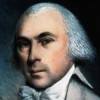The newspapers still talk about glory but the average man, thank God, has got rid of that illusion. It is a damned bore, with a stalemate as the most probable outcome, but one has to see it through, and see it through with the knowledge that whichever side wins, civilisation in Europe will be pipped for the next 30 years. Don’t indulge in Romance here, Malcolm, or suppose that an era of jolly little nationalities is dawning. We shall be much too much occupied with pestilence and poverty to reconstruct.
E. M. Forster (1879-1970) English novelist, essayist, critic, librettist [Edward Morgan Forster]
Letter to Malcolm Darling (6 Nov 1914)
(Source)
Quotations about:
Europe
Note not all quotations have been tagged, so Search may find additional quotes on this topic.
Experience declares that man is the only animal which devours its own kind; for I can apply no milder term to the governments of Europe, and to the general prey of the rich upon the poor.
Thomas Jefferson (1743-1826) American political philosopher, polymath, statesman, US President (1801-09)
Letter (1787-01-16) to Edward Carrington
(Source)
The old century is very nearly out, and leaves the world in a pretty pass, and the British Empire is playing the devil in it as never an empire before on so large a scale. We may live to see its fall. All the nations of Europe are making the same hell upon earth in China, massacring and pillaging and raping in the captured cities as outrageously as in the Middle Ages. The Emperor of Germany gives the word for slaughter and the Pope looks on and approves. In South Africa our troops are burning farms under Kitchener’s command, and the Queen and the two houses of Parliament, and the bench of bishops thank God publicly and vote money for the work. The Americans are spending fifty millions a year on slaughtering the Filipinos; the King of the Belgians has invested his whole fortune on the Congo, where he is brutalizing the Negroes to fill his pockets. The French and Italians for the moment are playing a less prominent part in the slaughter, but their inactivity grieves them. The whole white race is reveling openly in violence, as though it had never pretended to be Christian. God’s equal curse be on them all! So ends the famous nineteenth century into which we were so proud to have been born.
Wilfrid Scawen Blunt (1840-1922) English poet, critic, horse breeder
My Diaries, 1888-1914, 22 Dec 1900 (1921)
(Source)
Europe […] have totally mistaken our character. Accustomed to rise at a feather themselves, and to be always fighting, they will see in our conduct, fairly stated, that acquiescence under wrong, to a certain degree, is wisdom & not pusillanimity, and that peace and happiness are preferable to that false honor which, by eternal wars, keeps their people in eternal labor, want and wretchedness.
Thomas Jefferson (1743-1826) American political philosopher, polymath, statesman, US President (1801-09)
Letter (1815-03-23) to James Madison
(Source)
I have ever deemed it fundamental for the United States never to take an active part in the quarrels of Europe. Their political interests are entirely distinct from ours. Their mutual jealousies, their balance of power, their complicated alliances, their forms and principles of government, are all foreign to us. They are nations of eternal war.
Thomas Jefferson (1743-1826) American political philosopher, polymath, statesman, US President (1801-09)
Letter (1823-06-11) to James Monroe
(Source)
A decline in courage may be the most striking feature that an outside observer notices in the West today. The Western world has lost its civic courage, both as a whole and separately, in each country, in each government, in each political party, and, of course, in the United Nations. Such a decline in courage is particularly noticeable among the ruling and intellectual elites, causing an impression of a loss of courage by the entire society. There are many courageous individuals, but they have no determining influence on public life.
Political and intellectual functionaries exhibit this depression, passivity, and perplexity in their actions and in their statements, and even more so in their self-serving rationales as to how realistic, reasonable, and intellectually and even morally justified it is to base state policies on weakness and cowardice. And the decline in courage, at times attaining what could be termed a lack of manhood, is ironically emphasized by occasional outbursts and inflexibility on the part of those same functionaries when dealing with weak governments and with countries that lack support, or with doomed currents which clearly cannot offer resistance. But they get tongue-tied and paralyzed when they deal with powerful governments and threatening forces, with aggressors and international terrorists.
Should one point out that from ancient times decline in courage has been considered the beginning of the end?
Alexander Solzhenitsen (1918-2008) Russian novelist, emigre [Aleksandr Isayevich Solzhenitsyn]
“A World Split Apart,” Commencement Address, Harvard (8 Jun 1978)
(Source)
Without any censorship, in the West fashionable trends of thought and ideas are carefully separated from those which are not fashionable; nothing is forbidden, but what is not fashionable will hardly ever find its way into periodicals or books or be heard in colleges. Legally your researchers are free, but they are conditioned by the fashion of the day. There is no open violence such as in the East; however, a selection dictated by fashion and the need to match mass standards frequently prevent independent-minded people from giving their contribution to public life. There is a dangerous tendency to form a herd, shutting off successful development.
Alexander Solzhenitsen (1918-2008) Russian novelist, emigre [Aleksandr Isayevich Solzhenitsyn]
“A World Split Apart,” Commencement Address, Harvard (8 Jun 1978)
(Source)
The purpose of separation of church and state is to keep forever from these shores the ceaseless strife that has soaked the soil of Europe in blood for centuries.
James Madison (1751-1836) American statesman, political theorist, US President (1809-17)
(Spurious)
This has been cited as in an 1803 letter objecting to building churches on government land, but, while not out of keeping with Madison's rhetoric, it has not actually been found in Madison's writings.





